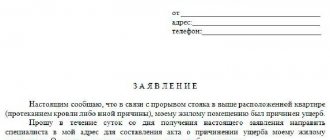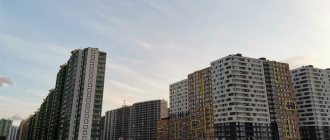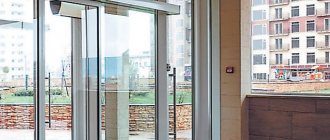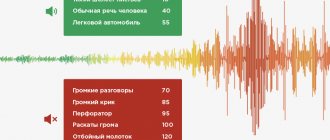The existing judicial practice in cases of flooding of apartments is multifaceted . After all, there may be several reasons for such an incident. We omit our own negligence within the framework of this material.
The majority of floods are caused by the actions of neighbors. But flooding is also caused by low-quality equipment purchased to make life easier at home. Then the legislation on consumer protection comes into force.
When neighbors upstairs flood , the case usually ends up in court. And here it is necessary to competently approach the formation of the evidence base. The causes of the incident and its culprit are officially confirmed. The amount of damage is determined separately.
Owner's procedure for flooding
The law provides for the liability of the perpetrator for causing damage to the property of third parties in the form of compensation for the costs of its restoration. The parties can independently agree on how this will happen.
Often neighbors cannot come to an amicable agreement, then the victim is subject to a number of obligations - it is necessary to prove the fact that the home was flooded. It is important not to get confused and strictly follow the algorithm of actions.
First of all, determine the cause of the housing flood. Identify the person whose fault caused damage to property as a result of the flood.
The culprit could be:
- Management Company;
- neighbor or other third party;
- HOA.
If litigation is inevitable, then you should thoroughly prepare for it. Draw up a statement of claim regarding the flooding of the apartment, without which it is impossible to bring the culprit of the accident to justice, regardless of any evidence.
The Supreme Court told how to identify the culprit in an apartment flood
In disputes over an apartment flood, the injured plaintiff must prove three main things: the fact of the incident, establish the source of the flood, and also justify the damage caused in monetary terms. Everything else will have to be confirmed by the defendant, says Vladislav Salita from Yusland Yusland Regional Rating. group Foreign trade activities/Customs law and currency regulation group Arbitration proceedings (medium and small disputes - mid market) group Dispute resolution in courts of general jurisdiction group Criminal law 11-12th place By number of lawyers. However, determining the cause of an accident is not always easy.
Flood from the battery
In the summer of 2021, the State Budgetary Institution “Zhilishchnik of the Otradnoye District” tested the heating system in an apartment building. During this work, the battery burst in the apartment of Anton Tomchin*, who was on a business trip in Saransk. Because of the accident, two of his neighbors, Sergei Kirillov* and Yegor Chitkin*, were flooded. Zhilishchnik employees drew up incident reports, indicating in them that Tomchin installed a new radiator in the apartment without the consent of the company’s management, which did not have a valve. And the property owner himself did not allow plumbers to come to his place and fixed the leak on his own, representatives of local authorities wrote in the documents.
The victims ordered an examination from Tsentrconsult LLC, which established that due to the incident, Kirillov’s housing suffered damage worth 425,566 rubles, and Chitkin’s – 587,754 rubles. Then the victims of the accident went to court and asked to recover the amount of damage from Tomchin and the State Budgetary Institution “Zhilishchnik Otradnoye District”. The budgetary institution, proving its innocence, presented accident reports drawn up by its own employees and other documents that confirmed that tests of the heating system were carried out in the house according to the rules. In addition, the court, at Tomchin’s request, ordered a construction and technical examination to GARBOR LLC to determine the cost of repairs from neighbors to eliminate the consequences of the incident. The study showed that Kirillov’s apartment will require 439,000 rubles, and Chitkin’s apartment – 462,400 rubles.
The Butyrsky District Court of Moscow decided to recover this money in full from Tomchin. The first instance referred to the fact that it was this defendant who, without the consent of the management company, installed a new radiator that did not have a valve. But such a device does not belong to the common property of the owners of an apartment building; accordingly, all responsibility for its maintenance and maintenance lies with the owner of the battery, the court emphasized. The appeal upheld the lower court's decision (case no. 33-35400/2018).
Without establishing the cause, they assigned the culprit
Then Tomchin challenged the acts of the capital’s courts in the Supreme Court. The Supreme Court immediately emphasized that in a controversial situation, the courts had to find out first of all whether the section of the engineering system that had broken belonged to the common property of the house. But the lower authorities did not do this, the Supreme Court pointed out (case No. 5-КГ18-321).
In addition, the capital’s courts did not properly appreciate the fact that the defendant was actually on a business trip in Saransk and could not independently eliminate the accident, as written in the Zhilischnik documents, the Supreme Court judges noted. So the conclusions of a budgetary institution about the causes of the accident look unfounded if the plumbers were unable to get into the apartment where the battery burst, the Supreme Court noted.
Moreover, the court’s reference to the fact that the leak in Tomchin’s apartment occurred due to a new battery without a valve is untenable, the Supreme Court judges believe. They indicated: based on Letter No. 9506-ACh/04 of the Ministry of Construction of Russia dated April 1, 2021, the absence of a controversial element does not interfere with the normal operation of radiators.
Thus, the lower courts did not actually establish the real causes of the accident, the Supreme Court pointed out. A trio of judges, chaired by Alexander Klikushin, canceled all the acts of the lower courts and sent the case back to the first instance for a new trial (editor's note - not yet considered).
Pravo.ru experts: “Repairs from the management company can become a trap”
The causes of such accidents should always be determined by specialists, says Olesya Spiricheva, lawyer at Borodin and Partners Borodin and Partners Regional Rating. . In an indisputable situation - by a management company or HOA, if the parties disagree with their conclusions - by independent specialists and/or forensic experts. When establishing guilt in what happened, courts are sometimes guided by the residual principle, warns Mikhail Osipov, lawyer at the Law Office “A2” Law Office “A2” Federal rating. group Arbitration proceedings (major disputes - high market) group Corporate law/Mergers and acquisitions (mid market) group Dispute resolution in courts of general jurisdiction: “If not in the area of responsibility of the housing and communal services organization, then certainly in the area of responsibility of the owner.” This approach involves bringing to civil liability regardless of guilt.
If a neighbor refuses to resolve the dispute amicably or violates the terms of the concluded settlement agreement, then he will have to go to court. Before applying there, you will need to obtain an opinion from a licensed appraiser, in which he will indicate the cost of the damage caused to the property, explains Vladislav Salita from Yusland Yusland Regional Rating. group Foreign trade activities/Customs law and currency regulation group Arbitration proceedings (medium and small disputes - mid market) group Dispute resolution in courts of general jurisdiction group Criminal law 11-12th place By number of lawyers.
Vladislav Kharchenko, lawyer Moscow Bar Association "Arbat" Moscow Bar Association "Arbat" Federal rating. , adds that in such disputes the court can order an examination and ask it two questions: 1) determine the cause of the flood and the area where it occurred; 2) determine the cost of restoration repairs without taking into account wear and tear at average market prices, that is, according to Art. 15 Civil Code.
When it turns out that the accident occurred due to the actions of the management company, whose guilt is confirmed in the drawn up act on the bay, then it is necessary to submit a pre-trial claim in order to compensate for the damage. Most often, such requests are left without consideration or the applicants are refused due to the fact that the requirements are too high, Salita states. According to him, sometimes the management company offers to carry out repairs themselves: “But practice shows that this is a trap, since the time frame for restoration will be very long, and the quality of work will be low.” In any case, the main difficulty in such litigation is not legal, but technical, says Spiricheva. According to her, in these cases everything is decided by forensic examination.
* – the names and surnames of the participants in the case have been changed.
- Alexey Malakhovsky
- Supreme Court of the Russian Federation
- Civil process
Apartment inspection report
The owner cannot eliminate the consequences of the flood immediately after the incident. First of all, it is necessary to draw up an apartment inspection report that will confirm the grounds and subject of the claim.
The preparation of this document is carried out by employees of the housing office, homeowners' association, and economic protection department with the direct participation of the owner of the apartment in which the flood occurred and representatives of the service organization.
This document is the main evidence of the event. It includes:
- established fact of flooding of housing;
- property damage;
- the causes of flooding or the impossibility of identifying them;
- description of the causes and consequences between the flood and the damage caused, etc.
Please note that several acts may be drawn up in a case. In case of disagreement, the owner has the right to challenge the act of flooding the apartment.
To record all the important circumstances, you can ask witnesses for clarification, draw up an alternative inspection report of the residential premises, or order an examination. The cost of the claim and the procedure for going to court will depend on the accurate assessment of the damage.
The timing of drawing up the bay act plays an important role. The consequences of flooding must be recorded within 12 hours from the moment of contacting the EDDS.
Supreme Court ruling in case No. 2-842/2018 on flooding
A flood in an apartment can be caused not only by a forgotten open tap, but also by household appliances, which are found in abundance in modern homes. And if a product is found to be defective, problems may arise not only for the owner of the apartment, but also for his neighbors.
A trivial situation. The hose on the washing machine or dishwasher installed in the kitchen bursts. Then damage is caused to several apartments at once.
It can be extremely difficult to immediately identify who is involved in such a situation. The manufacturer and seller are involved in the conflict.
The following precedent may be indicative. The case reached the Supreme Court, which understood the situation and sent the case for a new trial.
The essence of the dispute
The owner of the apartment installed a water filter, which was purchased at a specialized store, but turned out to be defective. There was a flood, which damaged not only the buyer’s home, but also several apartments below.
The seller admitted his guilt and paid the citizen material damages on a voluntary basis. However, the neighbors each filed a lawsuit on their own regarding the flooding of the apartment .
The buyer of the filter (the first victim) became the defendant. Based on court decisions to flood the apartment, he must pay his neighbors over 700 thousand rubles.
The next stage was a recourse claim against the organization for compensation of costs. Since the seller's liability was insured, he insisted on using an insurer as a third party. The first and appellate instances refused to satisfy the stated demands. Then a cassation appeal followed.
What the Supreme Court said
Determination No. 5-КГ19-193 dated December 3, 2019 contains several arguments that served as the basis for canceling previously made decisions. Thus, the courts wrongfully rejected the expert’s opinion about defects in the filter design. In fact, this was precisely the reason for the flooding of the lower apartments.
And also the previous authorities incorrectly considered that the seller was an improper defendant, since his liability was insured.
Separately, the Supreme Court of the Russian Federation drew attention to the fact that documents regarding the event were not presented to the insurer. Since the actual cause of the flooding has not been established, the case was sent for a new trial.
How to identify the culprit
In the classic case, a flood report is drawn up with the participation of an employee of the management company, the owner or tenant of the apartment where the flood occurred. The document describes the damage and indicates the culprit - the owner of the premises from which there was a leak.
But it happens that it is not immediately possible to establish it, as in the framework of the case under consideration. Often, when renovating an apartment, residents make changes to communications without permission. Then a forensic examination is required to determine its condition and determine the causes of flooding.
In this case, there was a specialist’s conclusion that the filter failed due to insufficient wall thickness and the absence of stiffeners. Accordingly, this is a manufacturing defect that served as a breakthrough.
Why is expertise important?
She has several main tasks. The first is to determine the actual causes of the incident that contributed to the damage caused by flooding of premises.
And for the conclusions to be reliable, it is necessary to outline a specific range of questions for the expert. After all, it determines the amount of real damage. Often, the conclusion also indicates the actual cost of restoration repairs.
If the flooding is due to poor-quality equipment, the expert points to the presence of a manufacturing defect. In this case, a link is provided to the regulatory documents from which the deviation was made.
Appraisal examination
Conducting an independent assessment allows the victim to substantiate the claim and recover compensation from the culprit. However, the culprit can also conduct an examination if he believes that the amount of damage was deliberately inflated.
The importance of assessing damage from an apartment flood for the court is so that the injured party can receive adequate compensation for the material damage caused and restore their living conditions.
What is assessed:
- Condition of the interior decoration of the residential premises (damage and cost of repairs). Having documents confirming the costs of previous repairs will be a big advantage.
- Damage to utilities (wiring, ventilation, heated floors, air conditioning system). When apartments are flooded, damage is almost always caused to engineering systems, which requires their replacement.
- Household appliances (water causes the greatest damage to household electrical appliances).
- Material assets and personal items that require repair or replacement costs.
An examination will allow you to comprehensively assess the damage after an apartment is flooded and answer the main questions:
- determine the cause of the flood and the person responsible;
- establish the difference in the market value of the apartment before and after the flood;
- calculate the cost of repair work to restore the facility.
If you are the culprit of the bay
We recommend that you always reach an agreement out of court, especially if the amount is up to 100 thousand rubles, because the losing party will also bear the legal costs of both parties. If it is difficult to pay the entire amount at once, ask your neighbors for an installment plan for 2-5 months.
However, if it was not possible to reach an agreement and you understand that the case is approaching trial, you need to carefully study 2 possibilities:
- The culprit may not be you, but the management company. If the breakthrough occurred before the 1st shut-off device, i.e. on the riser, or on the equipment. which was installed by specialists of the management company. The flood from the roof and sewerage also belongs to the management area of the management company.
- If your neighbors have filed a lawsuit against you and you see a clear overestimation in your neighbor’s assessment, apply for a forensic examination involving 3 independent appraisal companies. Or the judge himself will appoint a forensic expert.
The court's decision
After the court’s decision on the Gulf is made, you receive its text with a seal on entry into legal force along with a writ of execution. Check out our practice in courts here. You can take the latter to the bank responsible for the gulf, where a corresponding statement is written and within three days the funds specified in the writ of execution are transferred to you. If you do not know the defendant’s bank accounts, you should hand over the writ of execution to the bailiffs, who, after initiating enforcement proceedings, will begin to analyze the defendant’s funds, which can compensate for the damage caused to you. For maximum comfort for our clients, we provide the services of a lawyer who will represent your interests. An individual approach and knowledge of the circumstances of the assessment of your damaged property will maximally strengthen your position and argumentation when considering a claim for flooding of an apartment in court. You can get legal advice by phone, or leave your contact details and we will call you back.
Author of the publication: Philip Volodyaev
Which court should I go to?
If the culprit of the accident does not agree to compensation for damage, then:
- The dispute can be resolved through a magistrate's court if the amount of damage is less than 50 thousand rubles. (Article 23, paragraph 1, paragraph 5 of the Code of Civil Procedure of the Russian Federation)
- apply to the district or city court if the amount exceeds 50 thousand rubles. (Article 25 of the Code of Civil Procedure of the Russian Federation).
The defendant in the court will be the owner of the apartment in which the breakthrough occurred. If at the time of the flood there were third parties in the culprit’s apartment, then the statement of claim must still be sent to the owner. The owner is responsible for the maintenance of the residential premises.
Review period
It is also worth mentioning the time limits for consideration of claims by the court, provided for in Articles 154 and 152 of the Code of Civil Procedure of the Russian Federation:
- The magistrate is obliged to consider the case within one month from the date of filing the application with the court.
- for a district judge the terms are two months.
- The arbitration court is obliged to begin considering the claim within a period not exceeding 3 months.
It’s worth pointing out right away that the court is in no way responsible if the process is delayed, which happens quite often due to various circumstances. It is difficult to say in advance how many meetings will be required to make a decision on collecting compensation for the damages caused or releasing the culprit from liability.
Procedure for filing a claim
Particular attention must be paid to drafting the statement of claim. The requirements for it are contained in Chapter 12 of the Code of Civil Procedure, and failure to comply with them will result in the return of the claim or refusal to consider it.
In accordance with the rules, the claim must be prepared in simple written form, and its content must comply with general requirements.
The content of the statement of claim for compensation for damage caused by flooding of the apartment must include:
- the name of the judicial authority to which the claim is filed;
- information about the plaintiff and defendant, including the address of residence, legal address for the defendant - a legal entity or its location;
- amount of compensation for repair work. The amount to be recovered in favor of the plaintiff is calculated on the basis of an independent appraisal report;
- the price of the state duty paid by the plaintiff;
- title of the statement of claim;
- date and causes of the accident;
- data on the examination;
- evidence on which the plaintiff's claims are based;
- reference to legal norms on violation of the rights and property interests of the injured party;
- list of documents attached to the application;
- applicant's signature and date.
In addition, the contents of the statement of claim may indicate the details of the applicant, defendant or representatives of the parties.
Evaluation report
Must comply with Valuation Law No. 135 Federal Law. Judges trust evaluation reports because... The appraiser must be certified, be a member of an SRO, be insured and be liable with his own property in case of damage.
Contains:
- detailed description of damage
- photo report from the inspection
- market research for construction materials and works
- identification of average market prices
- drawing up estimates in accordance with SNiP
- attached documents of the specialist and the company
As a result, you receive an official document with a thickness of 60 to 150 pages, you can order it by phone, or leave your contacts and we will call you back.
A few points regarding reviewing the assessment report:
- In the case when one party presented this document to the court, it will be based precisely on the given clear calculations of the damage caused, the market value of compensation for materials and work described in the report.
- The presence of two different valuation results will mean that the judge will need to listen to the positions of the appraisers, compare their persuasiveness in calculating the value and indicating the specific property, and make a decision based on these conclusions. If the testimony of representatives of the appraisal company does not provide the expected information, a corresponding forensic examination is carried out, during which a third appraiser is engaged to draw up his report. It is on the basis of the forensic examination that the judge makes a decision regarding the amount of compensation.
Documents for the claim
To prove the validity of their claims, the victim must prepare an additional list of documents in addition to the claim. These documents must contain evidence of the defendant’s guilt and information about the damage caused.
Sample list of documents:
- document confirming the identity of the plaintiff;
- document on ownership of the apartment;
- extract from the Unified State Register and house register;
- information about an attempt to pre-trial resolve the dispute with the culprit;
- the results of the examination or a request for its conduct;
- act on the bay of the object;
- evidence of the bay in photo and video format;
- evaluation report.
This list is not complete. Only the presence of objective evidence makes it possible to obtain compensation from the defendant.
It is not recommended to carry out repair work until the end of the trial. Otherwise, the defendant may request a re-evaluation to reduce the award.
Time limits for going to court
If an apartment is flooded, the owner can go to court within 3 years from the date of the incident. The longer the time has passed since the flood, the less chance the applicant has of compensation.
If during this time the victim carried out repairs, then it is almost impossible to achieve satisfaction of the claim. Costs cannot be proven even if there are receipts confirming repair costs.
The duration of the trial itself in Gulf cases is 2 months. But in fact, it drags on for up to six months due to the assessment procedure, examination or due to other studies.
The court's decision comes into force after a month, so if the applicant's demands are not satisfied, he can appeal the decision within this period.
Flood claim form
The application is an appeal from a flood victim. When compiling it, the homeowner asks to understand the reasons for what happened. The housing office employee has no right to refuse this. However, the law does not contain any indication of a rigid form. The application is drawn up in free form.
When contacting the housing office regarding the flood, the owner will receive a piece of paper, and an employee will help draw up a complaint.
Perhaps the form already has a heading indicating the person in whose name the application is being submitted. For the rest, the owner of the apartment independently and in free form sets out the circumstances of the case.
Attention! Although the document does not provide a rigid form, when drawing it up it is necessary to comply with the rules of business turnover.
Among them are required:
- compose text in Russian,
- errors and corrections, blots are unacceptable,
- succinctly and completely state the circumstances of the case,
- The document is signed by the originator and dated.
An application is submitted to the Housing Office. One copy is sufficient for acceptance. If the owner fears that his appeal will be lost or ignored, he can make a second copy and ask the receiving housing office employee to sign and date the registration.
Claimant's costs
If, when flooding an apartment, the victim did not settle the dispute with the culprit out of court, then in order to initiate a lawsuit, costs will be required for:
- State duty - from 400 to 60 thousand rubles, depends on the price of the claim and is established by Art. 333.19 Tax Code of the Russian Federation;
- postal delivery – up to 200 rubles;
- representative services – up to 20 thousand rubles;
- filing a claim – from 3 thousand rubles;
- expertise – prices depend on the region;
- assessment – determined by the company individually.
Judicial practice regarding the flooding of an apartment
The Supreme Court explained: “The plaintiff may misidentify the defendant and may not have documentation of the extent of the damage suffered, but this should not be a basis for denying compensation.”
The direct purpose of the court is to eliminate all errors that prevent a fair decision.
To receive compensation, you must provide evidence of flooding of the apartment by your neighbors. Recovery of damages is possible only if the identity of the guilty party is correctly established.
Examples:
- The decision in case No. 2-10957/2019 on the recovery of damage caused by the flooding of the apartment, penalties, compensation for moral damage, fines, legal costs - to be refused.
- The decision in case No. 2-2381/2019 on compensation for damages, with the participation of the parties and their representatives, is satisfied.
No. 1 Example from judicial practice
The management company planned to start heating and warned citizens about it. The owner of one of the apartments, Elena, went to work. At this time, an old radiator in her apartment burst due to high pressure.
As a result of the accident, 3 floors were flooded. Elena's neighbors from the apartment below were at home and immediately called the emergency service. However, they did not have the neighbor’s contact number.
A mechanic who arrived on call turned off the heating in order to minimize the loss. The neighbors asked him to open the door to Elena’s apartment in order to collect the water in her apartment, but the locksmith did not agree.
Then the neighbors called the local police officer, but he also forbade breaking the lock. As a result, the neighbors' apartment below suffered significant damage from water seeping through the ceilings.
It happens that the guilty person refuses to inspect the apartment. Then they go to court with a petition to order an examination. According to the court's decision, the neighbor will not be able to avoid the procedure.
Regardless of the amount of damage caused, criminal law provides for penalties for unauthorized entry into a home.
No. 2 Example from judicial practice
A resident of the Kemerovo region filed a lawsuit against her neighbors and the management company. The plaintiff asked for compensation for damages to restore repairs, examination costs and payment of state fees in a total amount of 375 thousand rubles.
It was determined that the cause of the flood was a pipe failure in the neighbors upstairs. The greatest damage was caused to the bathroom and living room, as evidenced by the report drawn up by the management company.
The defendants confirmed the harm caused, but refused to satisfy the claims. However, by decision of the Belovsky City Court of the Kemerovo Region, the claim was satisfied.
The defendants filed an objection to the claim to the Kemerovo Regional Court, which completely overturned this decision. The claims against the defendants in the lawsuit were rejected, and the plaintiff was charged the costs of appeal. The victim did not agree with the decision and appealed to the Supreme Court, which provided clarifications.
Who's the culprit
The Supreme Court, having familiarized itself with the materials of the complaint and the decision of the regional court, ruled that the appellate court violated the norms of substantive and procedural law.
The management company is responsible for the maintenance and repair of common property, and the obligation to prevent physical deterioration of communication systems. In addition, the appellate court had to establish the circumstances of the accident and factual confirmation of the action or inaction of the owners during the flood.
Error in identifying the defendant
The appeal was granted due to the fact that the plaintiff demanded joint and several liability from the perpetrators. The Supreme Court did not share the opinion of the regional court.
The position of the regional court was that since the management company was found to be the culprit, while the plaintiff insisted on compensation from both defendants, the court decided to refuse to satisfy the claims in full. The decision is incorrect and violates the rights of the victim.
Who compensates for damage from flooding: the position of the Supreme Court
General payment rules are given in Chapter 59 of the Civil Code (Civil Code of the Russian Federation). In accordance with Art. 1054 damage caused to property is subject to compensation in full. This provision corresponds to Article 15, which states that losses caused are compensated in full.
When flooding occurred due to the fault of the management company or due to the use of low-quality household appliances, the provisions of the law on the protection of consumer rights are applied.
Article 14 enshrines the principle of full property liability of the seller, the manufacturer of the goods. In addition, when demands are not satisfied voluntarily, penalties are also imposed.
In disputes over flooding of an apartment, one cannot do without the norms of housing legislation. So, according to paragraph 4 of Art. 30 of the Housing Code of the Russian Federation, the owner of the property is obliged to maintain it in proper condition and to prevent mismanagement of it.
At the same time, residents must comply with the rules for using residential premises and common property in an apartment building.
The management company has its own obligations. In Art. 161 of the RF Housing Code deals with the maintenance and repair of common property. Accordingly, liability is provided for ignoring duties.











